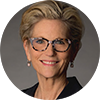Download PDF

I’m burned out on so many articles about burnout.” This statement—by a member of EyeNet’s Editorial Board—caught my attention because I, too, get a bit weary of advice about how to avoid or address burnout. We’re told to meditate, exercise more, eat healthier food, reframe negative thoughts, and do yoga between patients. I know all this, but some days, I just need time to run to the bathroom.
Burnout was a frequent topic of conversation at AAO 2021, and, as a theme, it stood out in sharp contrast to the joy of finally being together in person. For many of us, the meeting in New Orleans was our first large medical meeting in nearly two years. We lingered in conversation, savored the collegiality, and shared our pandemic experiences. Thanks to these exchanges, my thinking on burnout shifted a bit.
Burnout and the accompanying need for wellness were important topics long before COVID emerged. For example, physicians die by suicide at more than double the rate of the general population, and women physicians have an even higher risk of suicide, with rates nearly 2.5 times higher than those for women in general.1 It’s sobering. Many organizations, including the Academy, have been proactive in promoting physician wellness (see aao.org/wellness).
But the pandemic added complexity and intensity to our lives in particular ways. We continued to care for our patients, examining them face to face, for eight months before the vaccine was available. Once the initial shutdown ended, many of us had backlogs of patients. In my glaucoma practice, a disturbing number of patients developed uncontrolled disease due to pandemic-related delayed care.
When patients did return, many of them had significant anxiety about safety, and even more were simply lonely. Our patients look to us for reassurance, support, and advice. Because we are healers, ophthalmologists provide this connection, but we have been required to do so at higher levels than usual. Many of us report a new level of exhaustion at the end of the day, and some of it must be emotional fatigue.
To add to this, we are short-staffed. When a technician must quarantine due to a COVID exposure, it affects the entire team. It’s hard for our employees to take much-needed time off, and they are weary. They too need our support.
As for the ever-present Zoom, in some ways, it has enhanced our lives. I recently spoke at meetings in Tunis, Amman, and Delhi, and I benefited from interacting with colleagues from other regions of the world. But zooming is also tiring, and it impinges on our early morning and evening hours. It’s as though we are always “on.” When an industry representative asked me how he might connect, I told him, “Please don’t ask me to hop on another Zoom call.”
Perhaps the most surprising thing I learned about stress and burnout during COVID is how important vacations are. During the first year of the pandemic, most of my colleagues took very little time off from work because vacation choices were limited and most of us were reluctant to fly. And now, taking time off makes our sessions busier. Before the pandemic, I’d probably assumed that physicians take vacations because we can. Now, it’s obvious that we need them. The pressures and intensity of our work is sustainable only if we take breaks from it.
Sometimes the break isn’t a vacation; instead, it’s for a medical or committee meeting. These interludes are refreshing and encouraging, and we deeply miss them. We also miss our colleagues. The meal together, the conversation at a break, the unexpected sighting of someone we trained with: These encounters are with people who share the same stressors and life experiences—and with whom we share a common goal.
Our workloads aren’t going to magically decrease any time soon. Due to the aging demographic, we will have more work than ever, and the pressures on us will remain. Workforce shortages will continue. As we emerge from the pandemic into an extended era of endemic COVID, it’s more important than ever to attend to personal wellness. I might even learn to meditate.
___________________________
1 Schernhammer ES, Colditz GA. Am J Psychiatry. 2004;161(12):2295-2302.